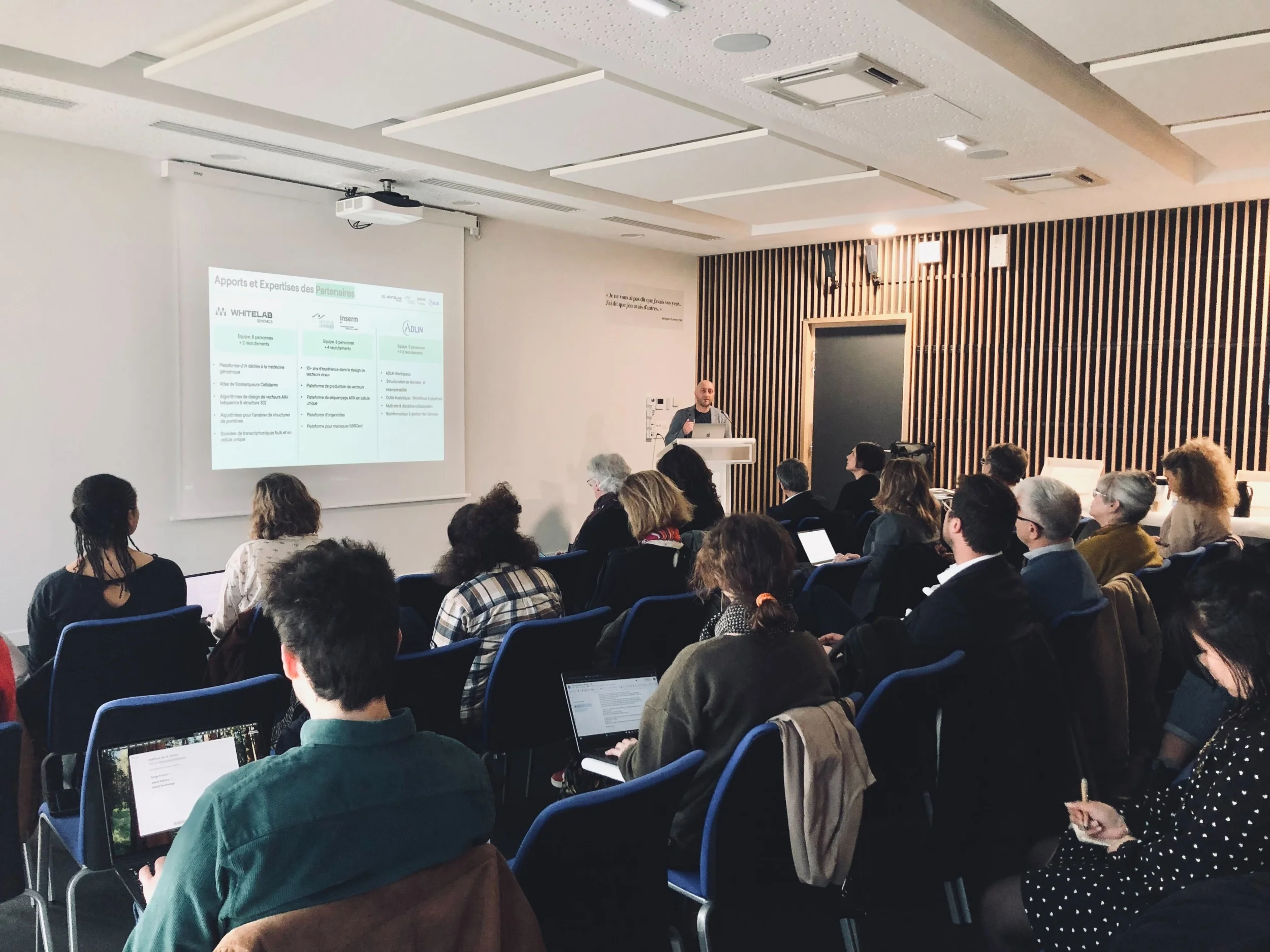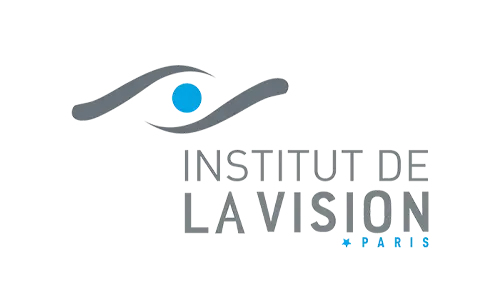
The Vision Institute, WhiteLab Genomics, and Adlin Science Announce Key Initial Scientific Results for the Development of Gene Therapies in Ophthalmology
Paris, France – Less than a year after its launch, the GEAR Consortium (Gene Therapy Evaluation for the Retina using AAV and AI-based Rational Design) — which brings together the Vision Institute, an international research center specializing in eye diseases; WhiteLab Genomics, an expert in AI for genomic medicine; and Adlin Science, which develops a decentralized digital research environment—announces a major scientific milestone: the identification of specific cellular targets (“receptors”) that enable the optimized delivery of therapeutic genes directly to diseased retinal cells.
Paris, 3rd April, 2025
Less than a year after its launch, the GEAR Consortium (Gene Therapy Evaluation for the Retina using AAV and AI-based Rational Design) — which brings together the Vision Institute, an international research center specializing in eye diseases; WhiteLab Genomics, an expert in AI for genomic medicine; and Adlin Science, which develops a decentralized digital research environment—announces a major scientific milestone: the identification of specific cellular targets (“receptors”) that enable the optimized delivery of therapeutic genes directly to diseased retinal cells.
A Key Scientific Barrier Lifted: The Entry Points of Retinal Cells Identified
Thanks to a combination of expertise in biology, data science, and artificial intelligence, the consortium teams successfully identified the receptors present on the surface of retinal cells—key proteins that act as "locks" to guide viral vectors to their intended targets. Four receptors have been identified, and one of them has been selected as a target for designing next generation therapeutic AAV (adeno-associated virus) vectors. “This is a crucial step. It paves the way for the creation of optimized AAV vector libraries and their in vivo validation in the coming months,” says Deniz Dalkara, Research Director at the Vision Institute and a specialist in viral vectors for gene therapy.
The Challenges of Genomic Medicine in Ophthalmology
Gene therapy holds significant promise for treating retinal diseases of genetic or degenerative origin. However, the cells essential for vision remain particularly difficult to target. Their location in the outer retina, the eye’s natural physical barriers, and the lack of specifically adapted viral vectors have hindered therapeutic progress. The GEAR Consortium aims to overcome these challenges by developing vectors capable of effectively delivering therapeutic genes precisely to the right place, while minimizing the required dosage—representing a major breakthrough for diseases that currently have no treatment options.
Artificial Intelligence to Guide the Design of Tomorrow’s Therapies
One of the GEAR project’s most innovative aspects lies in its use of artificial intelligence to rationally design future viral vectors. Together, the teams at WhiteLab Genomics and Institut de la Vision are applying combinatorial and machine learning approaches to predict, generate, and test AAV variants with strong therapeutic potential. This AI-driven strategy not only accelerates the identification of biological targets such as cell-surface receptors but also optimizes the design of custom vectors capable of overcoming the specific barriers of the human retina. “These results strengthen our belief that AI can transform the development of genomic medicines and accelerate their delivery to patients,” explains David Del Bourgo, CEO of WhiteLab Genomics.
A Powerful Digital Infrastructure to Support Reliable Innovation
Adlin Science plays a central role in managing, tracing, and visualizing the project’s multi-omic data (e.g., RNA, crystalline structures). Through its digital platform, Adlin Workspace, for research data management, high-throughput sequencing data analysis has been standardized, enabling seamless collaboration between biologists and bioinformaticians.
GEAR: A Strategic Project under France 2030
With a €4 million budget, the GEAR project is co-funded by the French government and the Île-de-France Region as part of the regionally tailored i-Demo call for projects under the France 2030 plan, operated by Bpifrance. Certified by the Medicen Innovation Cluster (Le pôle de compétitivité Medicen), the project aligns with France’s national ambition to become a leader in AI-driven biotherapies.
The collaboration
About Vision Institute
Founded in 2009 in Paris, the Vision Institute is an internationally recognized center of excellence for fundamental, translational, and clinical research on vision diseases. With its unique organization bringing together researchers, clinicians, and industry leaders around patient needs, it plays a key role in the development of innovative therapeutic solutions to prevent, slow, or reverse vision loss. The Institute has cutting-edge technological platforms and actively participates in numerous clinical trials and collaborative projects on a European and global scale. Among its leading scientific figures, Deniz Dalkara, Research Director at Inserm, is a world-renowned expert in ocular gene therapy. She is particularly recognized for her groundbreaking work on the development of AAV vectors to improve the delivery of therapeutic genes to retinal cells. Her research also focuses on the use of optogenetics to restore vision in degenerative diseases such as retinitis pigmentosa.
Visit their website at www.institut-vision.org
About WhiteLab Genomics
WhiteLab Genomics, a pioneer in the accelerated development of genomic medicines, sits at the intersection of artificial intelligence and biology. Founded in 2019 and supported by Y-Combinator, the company is establishing itself as a key player in genomic medicine innovation. Its proprietary AI technology enables the analysis of complex biological data and the in silico design of optimized therapeutic candidates, thus reducing development time, costs, and associated risks. WhiteLab collaborates with major pharmaceutical companies (such as Sanofi), leading academic institutions, and innovative biotech companies. WhiteLab is a member of the prestigious French Tech 2030 program and recently joined Bayer Co.Lab in Cambridge (USA) as well as the Technology Network of Ginkgo Bioworks.
Visit our website at whitelabgx.com Follow us on LinkedIn
About Adlin Science
Founded in 2020, Adlin Science developed Adlin Workspace, the first digital collaborative platform designed to structure protocols, manage experimental data, and standardize research workflows according to FAIR-by-Design principles. It caters to all stakeholders in biomedical research—biologists, bioinformaticians, data scientists, technicians, and team leaders—by facilitating the implementation, monitoring, and valorization of scientific projects. With its integrative and decentralized technological infrastructure, Adlin accelerates innovation in precision medicine and enhances collaboration between academic institutions, hospitals, and industrial players (biotechs, pharmaceuticals).
Visit our website at adlin-science.com
In the News
l’Usine Nouvelle https://www.usinenouvelle.com/editorial/la-start-up-whitelab-genomics-met-son-ia-au-service-des-therapies-geniques-ophtalmologiques.N2230154
Le quotidien du medecin https://www.lequotidiendumedecin.fr/actu-medicale/recherche-science/restaurer-la-vision-avec-de-nouvelles-therapies-geniques-pilotees-par-lia
Mind Health https://www.mind.eu.com/health/industrie/le-consortium-gear-devoile-ses-premiers-resultats-en-ophtalmologie/
Le quotidien du pharmacien https://www.lequotidiendupharmacien.fr/formation/specialites-medicales/ophtalmologie/des-therapies-geniques-pilotees-par-lia-pour-redonner-la-vue
l'Usine Nouvelle https://www.usinenouvelle.com/article/a-paris-l-institut-de-la-vision-mise-sur-les-therapies-geniques-pour-redonner-la-vue.N2230837
WhiteLab Media Inquiries
Please direct all inquiries to press@whitelabgx.com
Follow us on LinkedIn


